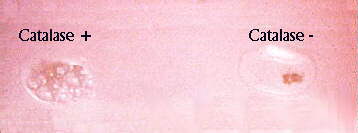

Some bacteria and macrophages can reduce diatomic oxygen to hydrogen peroxide or superoxide. Both of these molecules are toxic to bacteria. Some bacteria, however, possess a defense mechanism which can minimize the harm done by the two compounds. These resistant bacteria use two enzymes to catalyze the conversion of hydrogen peroxide and superoxide back into diatomic oxygen and water. One of these enzymes is catalase and its presence can be detected by a simple test. The catalase test involves adding hydrogen peroxide to a culture sample or agar slant. If the bacteria in question produce catalase, they will convert the hydrogen peroxide and oxygen gas will be evolved. The evolution of gas causes bubbles to form and is indicative of a positive test.




